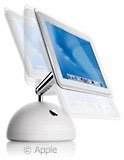For shareholders, there was a huge bonus. After a rash of warnings
from analysts about dire flat panel
iMac shipments and the effect on this quarters' results, there is
some hard news. With 125,000 already shipped and daily shipment rates
of over 5,000, the problems have been sorted out. So we can look
forward to shipments of 170-180,000 flat panel iMacs by quarter end.
This compares to the 200,000 that most analysts were looking for, so it
is unlikely there will be a profits warning.
The $100 increase in iMac prices shows that Apple has not managed to
lock in enough flat panels at low prices.  Despite the comments in DigiTimes about Apple being unable to
provide Quanta with a stable supply of flat panels, this is very
unlikely to be true. Apple made an investment in Samsung to guarantee a
stable long term supply.
Despite the comments in DigiTimes about Apple being unable to
provide Quanta with a stable supply of flat panels, this is very
unlikely to be true. Apple made an investment in Samsung to guarantee a
stable long term supply.
A previous report by Gillian Munson of Morgan Stanley indicated that
Apple had contracted for 100,000 panels a month for the next year.
Apple would have also contracted for the rest of the iMac components,
including memory, at the same rate, and would not have launched the
product without having these supply contracts in place.
These supply contracts will help Apple maintain margins over the
next quarter while it is clearing the backlog and honoring the old
prices for existing orders.
What is clear is that Apple underestimated demand for the new iMac.
This is probably fallout from the costs of the failure of the Cube. As I pointed out in The New Order, the flat panel iMac is the new
midrange, and therefore it is the Cube's replacement. If this iMac had
failed to sell, part of the cost of failure would have been questions
from analysts and shareholders as to why management had made the same
expensive mistake twice. This would have had a long term negative
effect on the share price and therefore management made the safe bet
and was only willing to commit to the numbers that could easily be
sold.
Nevertheless, if the new pricing does not kill the iMac momentum,
shareholders can look forward to a very good next quarter. Unit sales
of all systems should be close to or over 1 million - and with the
usual margins.
The Other Bonus
Losses in the Apple Retail Division will be much reduced this
quarter. Certainly this is a short term fix, but allocating 10% of iMac
production to the Apple stores means they should have sold 17-18,000
flat panel iMacs by quarter end. When sales of other systems are
factored in, total sales should exceed 25,000 - compared to 14,000
last quarter. As the analysis by Charles Woolf of Needham & Co.
shows break even at roughly 1,000 system sales per store per quarter,
the retail division should at least be close to reaching that.
The New iPod
Apple has now launched a 10 GB model which, at $499, is $100 more
than competitors and yet has half their capacity. This is not the way
to dominate a consumer electronics market, and the danger is that iPod
will become another Newton - an excellently designed product that is
priced out of the main market. If Apple had launched the new iPod at
$399 and cut the price of the 5 GB model, the iPod range would
have been well placed, continuing to be attractive to Wintel users and
keeping the pressure on competitors such as Rio and Archos.
As it is, Gateway has already launched a USB 2.0 model. As soon as
this new standard becomes more common in the Wintel world, the iPod
will have lost its main advantage: fast transfer rates. The iPod's
other advantages can not maintain such a big premium, so pricing needs
to be competitive long before USB 2.0 is widespread.
The new software, which allows up to 1,000 contacts, will extend
iPod's reach into the PDA market. It also helps to show iPod's
versatility. However it will take relentless price cutting to make the
Wintel market wait for iPod.
Bluetooth
Showing this working well will keep Apple in the forefront of the
digital hub providers as many smaller devices will use Bluetooth rather
than the 802.11 (AirPort) standards.
New Cinema Display
At 23", this is a minor step from the previous top of the range. The
press release showed this to be aimed at media editors for use with
Final Cut Pro on HDTV programs. This positioning again shows Apple's
interest in reinforcing its user base in film and TV.
Although the keynote was less than well received by many Mac sites,
there was more useful information than in previous years. Also,
announcements in Tokyo are primarily for the Japanese. This is the most
important market for Apple outside of North America, and it sounds as
though the new Kanji software from Ergosoft will help to strengthen the
Mac's position there. 

 Despite the
Despite the 
